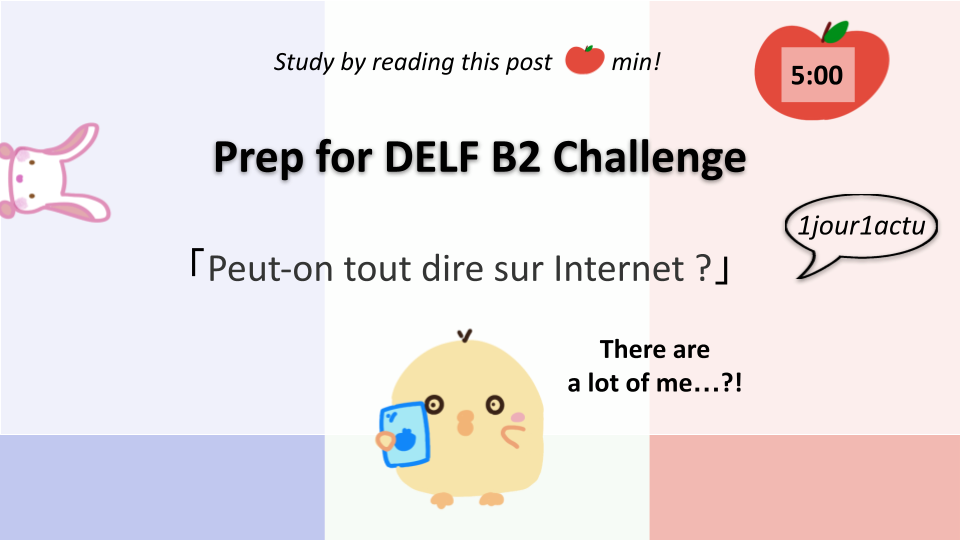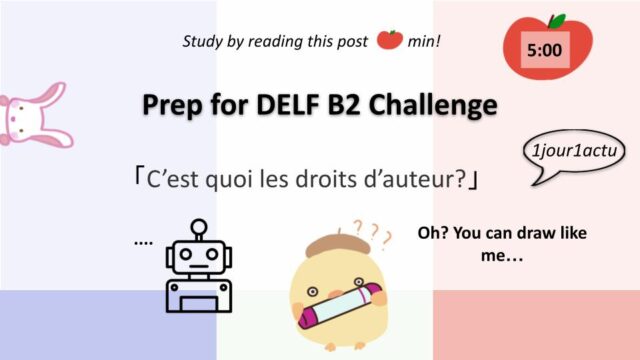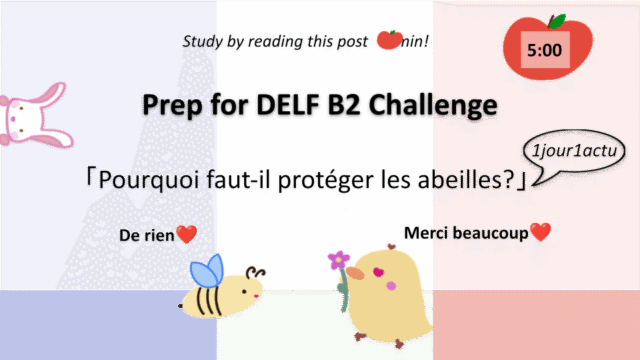【DELF B2 Prep】Can we say anything on Internet? from 1jour1actu

This post is 5 minutes read time. Aiming for studying by just reading!
My DELF B2 Preparation Blog – Listening & Writing Practice
Learning French Through Real Topics: Peut-on tout dire sur Internet ?– 1jour1actu
The Internet gives us the freedom to express ourselves. But is everything we say online really okay?
This article from 1jour1actu explores freedom of speech, personal boundaries, and online responsibility—perfect for DELF B2 preparation. It helps you build vocabulary, understand grammar, and write better essays, all while thinking critically about modern issues.
📌Today’s Key Sentence|Let’s read and understand the original
Même bien caché derrière ton écran, tu ne dois pas faire n’importe quoi.
Translation 👉 :
Even if you’re well hidden behind your screen, you must not do just anything.
🔍 Vocabulary & Grammar Breakdown
| French | English | Explanation |
|---|---|---|
| Même bien caché | Even well hidden | “même + past participle” shows concession (even if…). |
| derrière ton écran | behind your screen | Literal meaning, also used figuratively for online users. |
| ne… pas faire n’importe quoi | must not do just anything | “n’importe quoi” = whatever, anything. Often used to mean reckless behavior. |
📚Vocabulary Boost
| Expression | Meaning | Notes |
|---|---|---|
| la liberté d’expression | freedom of speech | A core concept in social and political discussions. |
| infos perso | personal information | Informal short form of informations personnelles. |
| moqueur / méchant | mocking / mean | Common in spoken and written expressions of emotions. |
| rumeur | rumor | Often used with “sans preuve” (without proof). |
| révéler | to reveal | Used in privacy or secret contexts. |
| amende | fine | Related to law and penalties. |
| cacher | to hide | Often appears as se cacher (to hide oneself). |
| importer | to matter / to import | In phrases like il n’importe pas = it doesn’t matter. |
| se moquer (de) | to make fun of | se moquer de quelqu’un = to mock someone. |
| menacer | to threaten | menacer quelqu’un = to threaten someone. |
| salir / salir la réputation | to tarnish | Metaphorically used to “dirty” someone’s reputation. |
| condamner | to sentence / condemn | Legal term. Past participle: condamné(e). |
| coupable | guilty | Opposite: innocent. Used in legal/ethical contexts. |
🧠 Bonus Vocabulary Insight: n’importe + question word
From the article:
Tu ne dois pas faire n’importe quoi.
“n’importe + question word (5W1H)” is a powerful expression to add nuance and generality. It appears often in speech and writing, especially for arguments or essays.
| Expression | Meaning | Example |
|---|---|---|
| n’importe quoi | anything (no matter what) | Don’t do just anything: Tu ne dois pas faire n’importe quoi. |
| n’importe qui | anyone | Anyone can read your post: N’importe qui peut le voir. |
| n’importe où | anywhere | Be careful where you post: Ne poste pas n’importe où. |
| n’importe quand | anytime | Posts stay visible anytime: C’est visible n’importe quand. |
| n’importe comment | anyhow | You can’t act just anyhow: Il ne faut pas agir n’importe comment. |
🔧 Grammar Focus | Key Structures for B2
Structure: Même + past participle
Meaning: Even though / even if
Use in writing: To express concession (unexpected outcome)
✅ Même fatigué, il est allé à l’école.
➝ Even though he was tired, he went to school.
Structure: Il est interdit de + infinitive
Meaning: It is forbidden to…
Use in writing: Explaining laws, rules, and social norms
✅ Il est interdit de publier des messages haineux.
➝ It is forbidden to post hateful messages.
📘 Essay Expressions | Ready-to-Use Phrases
| French Expression | Example in French | English Translation |
|---|---|---|
| Il est important de respecter… | Il est important de respecter les règles sur Internet. | It is important to respect rules online. |
| On ne doit pas oublier que… | On ne doit pas oublier que nos messages peuvent blesser les autres. | We must not forget that our words can hurt others. |
| De nos jours, Internet est… | De nos jours, Internet est un outil puissant mais dangereux. | Nowadays, the Internet is a powerful but dangerous tool. |
🖋️ Practice Writing | Short Essay Prompt
Sujet :Penses-tu qu’on peut tout dire sur Internet ? Pourquoi ou pourquoi pas?
(Do you think people should be allowed to say anything online? Why or why not?)
✍️ Model Answer (DELF B2 style):
🟦 Introduction
De nos jours, Internet est un espace où chacun peut s’exprimer librement. Mais cette liberté a-t-elle des limites ?🟩 Argument 1 – Oui, on a le droit d’exprimer ses opinions
Grâce à la liberté d’expression, il est possible de partager des idées et de débattre avec les autres.🟥 Argument 2 – Non, certains propos peuvent être dangereux
Cependant, les propos haineux ou les insultes peuvent blesser et nuire à la société. Il est donc nécessaire d’avoir des règles.🟨 Conclusion
En conclusion, on ne peut pas tout dire sur Internet. Il faut utiliser cette liberté avec responsabilité.
Translation:
🟦 Introduction
Nowadays, the Internet is a place where everyone can speak freely. But does this freedom have limits?
🟩 Argument 1 – Yes, we have the right to express ourselves
Thanks to freedom of speech, we can share our ideas and debate with others.
🟥 Argument 2 – But some comments can be dangerous
However, hateful or offensive messages can hurt others and damage society. That’s why we need rules.
🟨 Conclusion
In conclusion, we cannot say everything on the Internet. We must use our freedom with responsibility.
✅ Test Yourself | Final Quiz
Q1. Which of the following means “to mock someone”?
a) menacer
b) se moquer de
c) cacher
Q2. Complete: Il est interdit de ___ des messages haineux.
a) partager
b) cacher
c) publier
Q3. Which expression means “freedom of speech”?
a) liberté de penser
b) liberté de regarder
c) liberté d’expression
Answer
Q1. b) se moquer de
Q2. c) publier
Q3. c) liberté d’expression








